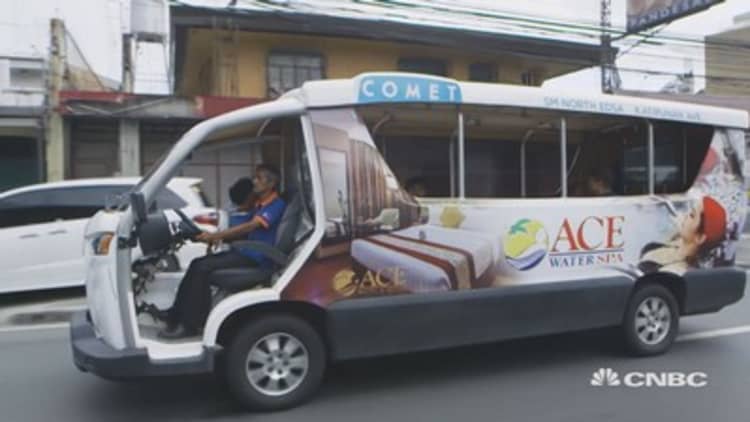
The Philippine's crowded capital, Manila, is notorious for its traffic jams and pollution. And one of the biggest sources of these problems? The city's famous jeepneys.
Global Electric Transport (GET) – which has offices in the U.S., Hong Kong and the Philippines – is looking to set up a "complete transportation ecosystem" for the city, introducing its COMET electric vehicle to replace the jeepney, which are a mini-buses based on the chassis of U.S. Army Jeeps left over in the Philippines after World War II.
"What we are trying to solve here is a problem," Freddie Tinga, GET's president, told CNBC's Sustainable Energy.
"Most companies, they try to sell a product… we are saying there is a problem out here – pollution, traffic and all of that," Tinga added.
"The idea is not only do you come up with an electric vehicle – and, mind you, not an electric vehicle for the rich but an electric vehicle for the masses… (but) then you manage it."
The COMET uses lithium ion batteries and can carry up to 20 people and reach a top speed of 55 kilometers per hour, according to GET.
"A jeepney generates about 40 kg of carbon dioxide emitted every day, so you take a jeepney out and you replace it with an electric vehicle that is how much you change," Tinga said.
"If our goal is to hit 20,000 of these units in three years' time, you are talking about 800,000 kilograms a day of carbon dioxide we will be taking out," he added.
Manila is not the only city looking to bring about a sea change in its transport system. In London hydrogen fuel buses, electric hybrid buses and over 1,000 electric charging points highlight a commitment to going green.
Back in the Philippines, commuter Sara Brillantes said that it was, "about time our government does something like this to regularize and to fix our transport system."





